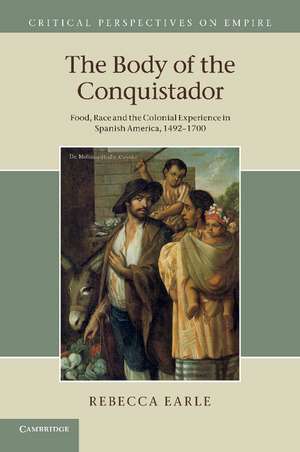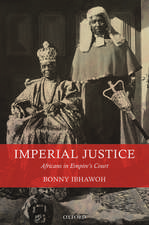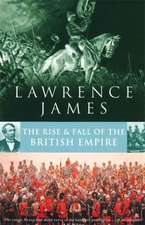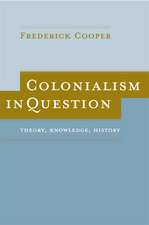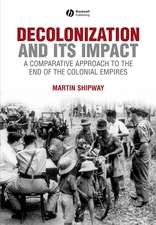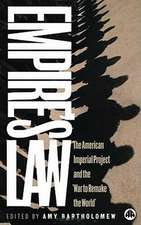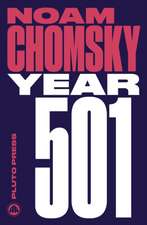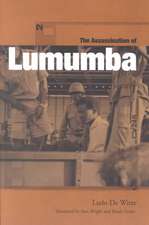The Body of the Conquistador: Food, Race and the Colonial Experience in Spanish America, 1492–1700: Critical Perspectives on Empire
Autor Rebecca Earleen Limba Engleză Paperback – 19 feb 2014
| Toate formatele și edițiile | Preț | Express |
|---|---|---|
| Paperback (1) | 159.35 lei 3-5 săpt. | |
| Cambridge University Press – 19 feb 2014 | 159.35 lei 3-5 săpt. | |
| Hardback (1) | 695.93 lei 6-8 săpt. | |
| Cambridge University Press – 22 apr 2012 | 695.93 lei 6-8 săpt. |
Din seria Critical Perspectives on Empire
-
 Preț: 259.43 lei
Preț: 259.43 lei -
 Preț: 235.13 lei
Preț: 235.13 lei -
 Preț: 230.71 lei
Preț: 230.71 lei - 11%
 Preț: 626.27 lei
Preț: 626.27 lei -
 Preț: 299.41 lei
Preț: 299.41 lei - 9%
 Preț: 629.32 lei
Preț: 629.32 lei -
 Preț: 291.69 lei
Preț: 291.69 lei -
 Preț: 279.30 lei
Preț: 279.30 lei - 5%
 Preț: 219.29 lei
Preț: 219.29 lei -
 Preț: 227.65 lei
Preț: 227.65 lei -
 Preț: 239.11 lei
Preț: 239.11 lei -
 Preț: 261.35 lei
Preț: 261.35 lei -
 Preț: 246.91 lei
Preț: 246.91 lei -
 Preț: 286.30 lei
Preț: 286.30 lei -
 Preț: 266.22 lei
Preț: 266.22 lei -
 Preț: 304.19 lei
Preț: 304.19 lei -
 Preț: 195.48 lei
Preț: 195.48 lei -
 Preț: 285.37 lei
Preț: 285.37 lei - 9%
 Preț: 662.85 lei
Preț: 662.85 lei - 11%
 Preț: 638.42 lei
Preț: 638.42 lei - 11%
 Preț: 584.90 lei
Preț: 584.90 lei -
 Preț: 361.54 lei
Preț: 361.54 lei -
 Preț: 208.89 lei
Preț: 208.89 lei -
 Preț: 321.31 lei
Preț: 321.31 lei -
 Preț: 222.86 lei
Preț: 222.86 lei -
 Preț: 325.16 lei
Preț: 325.16 lei -
 Preț: 286.51 lei
Preț: 286.51 lei -
 Preț: 326.92 lei
Preț: 326.92 lei -
 Preț: 324.79 lei
Preț: 324.79 lei -
 Preț: 285.54 lei
Preț: 285.54 lei
Preț: 159.35 lei
Nou
Puncte Express: 239
Preț estimativ în valută:
30.50€ • 33.11$ • 25.62£
30.50€ • 33.11$ • 25.62£
Carte disponibilă
Livrare economică 01-15 aprilie
Preluare comenzi: 021 569.72.76
Specificații
ISBN-13: 9781107693296
ISBN-10: 1107693292
Pagini: 278
Ilustrații: 21 b/w illus.
Dimensiuni: 152 x 229 x 15 mm
Greutate: 0.38 kg
Editura: Cambridge University Press
Colecția Cambridge University Press
Seria Critical Perspectives on Empire
Locul publicării:New York, United States
ISBN-10: 1107693292
Pagini: 278
Ilustrații: 21 b/w illus.
Dimensiuni: 152 x 229 x 15 mm
Greutate: 0.38 kg
Editura: Cambridge University Press
Colecția Cambridge University Press
Seria Critical Perspectives on Empire
Locul publicării:New York, United States
Cuprins
Introduction: food and the colonial experience; 1. Humoralism and the colonial body; 2. Protecting the European body; 3. Providential fertility; 4. Maize, which is their wheat; 5. You will become the same if you eat their food; 6. Mutable bodies in Spain and the Indies; Epilogue; Bibliography.
Recenzii
'With its focus on food and corporeal well-being, [this book] opens a fascinating new chapter in Spain's conquest and colonization of the Americas. What were Spaniards to eat as they encountered unfamiliar foodstuffs … that reportedly did irreparable damage to both body and mind? As for the natives, was their stature and temperament connected to 'the poor quality of the food they eat'? … As Earle explains in this new important study, these and related questions sparked lively debate on both sides of the Atlantic. Stunningly original and deeply researched, her book is not to be missed. It is essential reading for both the history of the Americas and early modern ideas about the relationship between food, culture, bodies, and health.' Richard L. Kagan, Arthur O. Lovejoy Professor of History, The Johns Hopkins University
'This book is a highly original study that uses a new and very fruitful methodological approach. Earle's research is superb and far- ranging. This is certainly a study that specialists of the colonial world, food history, and race should read.' Hispanic American Historical Review
'Clearly written and based on impressive primary and secondary research, Earle's book belongs in every academic and large public library. Essential.' Choice
'With this well-researched, erudite, and nuanced work, Earle has fundamentally shifted discussions of the colonial body, environmental history and the colonial enterprise itself … This fine book deserves a place on every Hispanist's bookshelf and will serve admirably in seminars on colonial Latin American and environmental history.' Jacqueline Holler, Journal of Colonialism and Colonial History
'This book is a highly original study that uses a new and very fruitful methodological approach. Earle's research is superb and far- ranging. This is certainly a study that specialists of the colonial world, food history, and race should read.' Hispanic American Historical Review
'Clearly written and based on impressive primary and secondary research, Earle's book belongs in every academic and large public library. Essential.' Choice
'With this well-researched, erudite, and nuanced work, Earle has fundamentally shifted discussions of the colonial body, environmental history and the colonial enterprise itself … This fine book deserves a place on every Hispanist's bookshelf and will serve admirably in seminars on colonial Latin American and environmental history.' Jacqueline Holler, Journal of Colonialism and Colonial History
Notă biografică
Descriere
This fascinating history explores the dynamic relationship between overseas colonisation in Spanish America and the bodily experience of eating.
